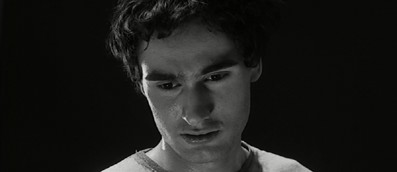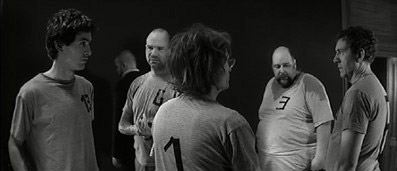|
If
ever there was a film that warned of the dangers of committing
yourself to an agreement without reading the small print
first then Tzameti is it. There's a strong
temptation to reveal none of the plot details and simply
encourage you with all my heart to see this film and make
every attempt to shield yourself from information about
its content. It's not that revealing it would put you off
(well at least I hope it wouldn't), but a large
part of the extraordinary grip the film exercises over its
audience definitely arises from a genuine fear – I might
even venture to say terror – over what will happen next.
This inevitably makes the first viewing the best, and an
unprepared encounter is always going to prove a superior experience
to one tainted by knowledge of how events will unfold. I'll admit that narrative and character tradition
do add a degree of inevitability to some aspects, but even
with that in mind I spent my first viewing of the film leaning
forward at an idiotic angle and chewing my thumbnails down
to the bare skin. Yeah, it's THAT tense.
So
where do I go from here? Although I believe the best way
to view the film is to go in cold, I am aware that before
even hiring any film for viewing, most of you will have heard about
it, read about it, seen a few suggestive stills and maybe
even a trailer or a few choice extracts. If so then you'll already
have lost your virginal status by the time you get to see
it. I also know that I could encourage a proportion of you
to see it precisely by revealing a few of the choice plot
details, and how the hell do you properly discuss or evaluate
the film without doing so? So here's the deal. If you know
little or nothing about the film and want to keep it that
way and go in cold, then click here
to skip to the technical specs of the disc. If you're prepared
to get your knowledge wet – and I promise to keep the revelations
to a minimum – then by all means proceed.

Here's
as much plot as you need, or should be given. Young Sebastién,
the son of an impoverished Georgian family, is hired to
repair the roof of a house owned by morphine-addicted Gordon.
When Gordon dies unexpectedly of an overdose, Sebastién
loses his sorely needed work, but on finding a letter sent
to Gordon providing a link to a mysterious but highly
paid job, he decides to go in his place. After following
a series of complex instructions designed to throw off anyone
who might be tailing him, he arrives at an isolated country house,
where he becomes an unwilling participant in a game with
deadly consequences.
It
takes almost half an hour to reach this point, but it's
time filled with intrigue and suggestion, from the snatches
of conversations heard by Sebastién through the damaged
roof to the watch being kept on the house and its inhabitants
by initially unidentified and possibly sinister figures.
Sebastién's journey to his unknown destination is
particularly well handled, a low key cat-and-mouse game
with closely pursuing authorities whom Sebastién
remains blissfully unaware of. But once he reaches his destination,
intrigue gives way in the blink of an edit of sheer, unrelenting
tension, and I mean unrelenting – I've had my share of five
minute terrors, but sitting through one that lasts
over a third of the film is a genuinely breathless experience.
Tzameti is a pared-to-the-bone thriller, a beautifully designed
exercise in audience wind-up that still manages to integrate
a subtextual layer – one concerned with the exploitation of the financially
desperate by morally bankrupt rich – without disrupting the
surface tension. Though it lacks any startling narrative
turns, comes to a somewhat inevitable conclusion, and features
at its core an activity that ewas an integral part of a more widely seen film from almost thirty years
ago (I'm not going to name it here), director Géla
Bubluani still manages to invigorate the material to such
a degree that it feels like a completely new experience.
And it still has its share of tension-raising twists, as
the stakes are repeatedly and unexpectedly upped in effectively
screw-turning fashion.

Shot
in scope and in true black and white (this was lit for mono,
not merely printed up from a colour original), the film
looks gorgeous and is very well played by one and all –
when characters are frightened here, their terror really
registers. Of course, the inevitable down side to any film
that relies in part on keeping its audience guessing is
that no subsequent viewing is ever going to match that first
one, but the sheer craftsmanship of the director and his
team ensures that second and third viewings bring their
own rewards. Whether you choose to buy or rent the film
is very much up to you, of course, but the one thing I would
urge everyone to do, without hesitation and without delay,
is see it.
The
anamorphic 2.35:1 picture here is very impressive, boasting
a very good tonal range, excellent detail and contrast, and
rock solid black levels. Some minor grain is evident and
a few compression artefacts can be seen in a couple of areas
of single shade, but on the whole this is an excellent job
that serves the film's moody visuals handsomely.
Both
stereo and 5.1 soundtracks are available, but there's no
real contest here – the 5.1 track is louder, fuller, and
is an essential element of the film's overpowering atmosphere
of dread.
No
commentary track, but with its limited locations and stripped-down
narrative this is not a film that is in need of one. What
we do have is an Interview With Géla (19:05), in which director Géla Bubluani discusses
his inspirations, his own Georgian past, the
making of the film, the choice to shoot in black
and white, the film's win at Venice, and future projects.
There
is also a a brief Interview with George (6:27), George being George Babluani, who plays Sebastién
and is the director's younger brother, a working relationship
that forms the basis of the first question asked of him.
He also discusses his first acting role and the acclaim
it has brought him, and specific aspects of the shoot. Both
interviews are in French with optional English subtitles.
Tzameti
is a wonderfully devised exercise is grinding an audience
into their seats and one hell of a debut feature. I've said
it already but it really is worth repeating: if you can
go into this film with little or no knowledge of its content
then you will reap the benefits. But even if you do have
some fore knowledge then still rush to see it – I was in
this position and it still managed to wind me up something
silly. Revolver's
DVD looks great, sounds good, and although somewhat light
on extras is still recommended. The replay value may be
not quite what it might be for some other movies, but a
second viewing still has its pleasures, in the handling,
the detail and the performances. It's also worth owning
just to get a few friends round and watch them while they
climb the wall.
|